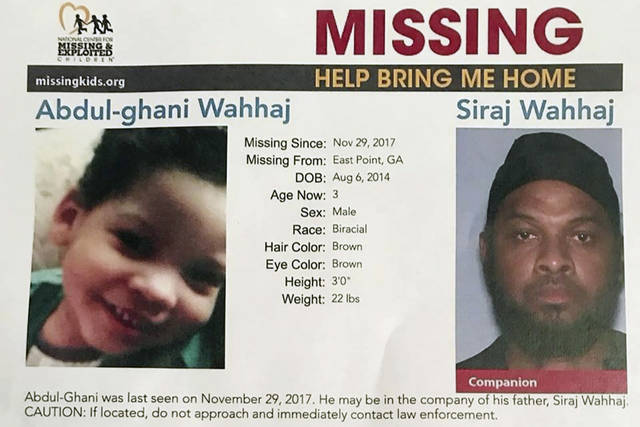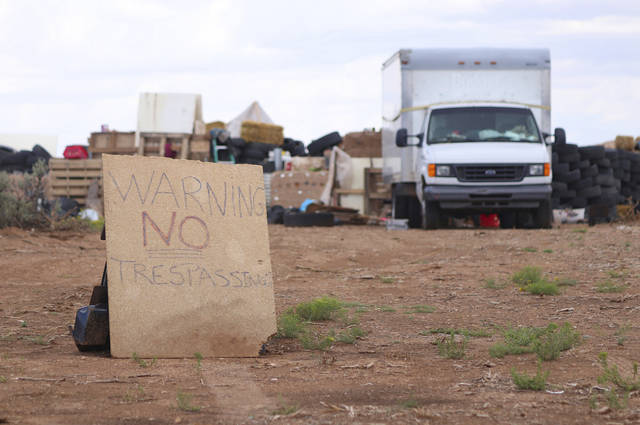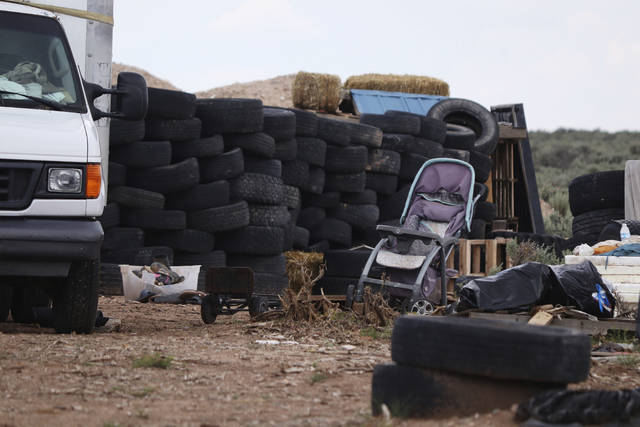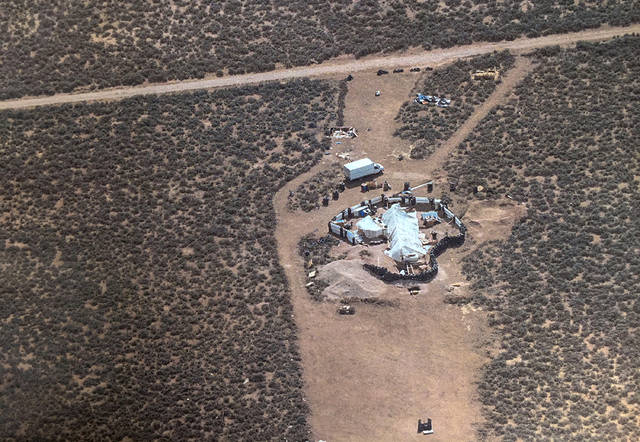SANTA FE, N.M. (AP) — Forensic investigators said Thursday they identified the remains of a Georgia boy whose father is accused of abducting him and performing purification rituals on the child as he died at a remote New Mexico desert compound. The cause of the child’s death remained unknown.
The body of Abdul-ghani Wahhaj (ahb-DOOL’ GAH’-nee wah-HAJ’) was found Aug. 6 in an underground tunnel. It was so severely decomposed that investigators could not yet determine how the severely disabled boy reported missing in December had died, New Mexico’s Office of the Medical Ivestigator said in a statement.
A spokeswoman for the office said it will be examining both the body and where the remains were located to seek to determine a cause and manner of death. A prosecutor said no charges regarding the death are imminent because officials don’t yet know how the boy died.
“All we have is a positive ID,” Donald Gallegos, the district attorney for Taos County in northern New Mexico, said in an interview. “We’ll need something else, actual cause of death, manner of death.”
Authorities have said they believe Abdul-ghani died in February, when he was 3.
The boy’s father, Siraj Ibn Wahhaj (see-DAHJ’ IBN wah-HAJ’), was among five people arrested on suspicion of child abuse at the compound near the Colorado state line, where authorities say 11 hungry children were found living in filth during a raid earlier this month. A search a few days later turned up the body in a tunnel.
Prosecutors seeking to keep Sirah Ibn Wahhaj and four members of his extended family behind bars said in court on Monday that he had been training some children at the compound to use firearms and carry out attacks on an anti-government mission that might target schools.
An FBI agent, citing interviews with two children from the compound, said Abdul-ghani died as relatives performed a ritual on the boy to cast out demonic spirits while reading from the Quran.
State District Court Judge Sarah Backus on Monday said the evidence provided by prosecutors was troubling but did not indicate any clear threat to public safety from the defendants, who have no criminal records.
She admonished prosecutors for apparently expecting her to take the defendants’ Muslim faith into account in her decision.
Defense attorneys disputed accusations of neglect and said guns on the property were legally owned.
The judge’s order cleared the way for the release of three defendants — two women and one man — on house arrest with ankle monitors.
But they had not been released as of Thursday amid concerns about their safety, in part stemming from threats of violence against Backus based on her order to release them.
Siraj Ibn Wahhaj will continue to be held on a warrant from Georgia that accuses him of abducting his son from the boy’s mother. Defendant Jany Leveille, a native of Haiti, has been transferred to the custody of federal immigration authorities.
Gallegos said his office will appeal Backus’ decision to allow the release of the three suspects.
“We gave her all the evidence we needed to and some of the evidence wasn’t allowed,” he said. “We’ll just see what another set of eyes and ears has to say.”
Von Chelet Leveille, a brother of Jany Leveille who lives in Haiti, said in an interview that he learned of Abdul-ghani’s death last winter amid daily WhatsApp text and voice conversations with his sister after her arrival in New Mexico.
The boy’s father previously had met with a faith healer in London and was desperate to explore new remedies for his son’s health problems, stemming from a lack of oxygen and blood flow at birth, Von Chelet Leveille said.
Von Chelet Leveille also said his sister told him that Abdul-ghani died while his father was performing an alternative, meditative Islamic healing ritual called ruqya that involves reading from the Quran.
The boy’s body was stored in a tunnel and washed every few days, and it showed little sign of decomposition for several months in the high-desert winter and spring, Von Chelet Leveille said from his home in the Haitian capital of Port-au-Prince.
That helped instill in his sister a belief that Abdul-ghani would be resurrected as Jesus — a fulfillment of the Islamic prophecy that Jesus will someday return and restore justice on earth.
“It was crazy to me,” he said. “They kept saying to me, ‘You’re not here, you’re not seeing what we’re seeing.’”
Von Chelet Leveille said the firearms training at the compound was a defensive measure because the family feared people might not tolerate their view that the boy would be resurrected as a black, Muslim person.
Kelly Golightley, a defense attorney for Jany Leveille, cautioned that her client’s brother comments were “from someone who wasn’t there.”
“I think that we really need to be careful about jumping to conclusions,” she said.
Authorities say Abdul-ghani initially was reported missing last year from Jonesboro, Georgia, by his mother after Siraj Ibn Wahhaj said he was taking the child to a park and didn’t return.
The mother, Hakima Ramzi, now has “some sense of closure in this matter,” said her lawyer, M. Khurram Baig.
He said she will cooperate with authorities in their investigation of the death if asked and that her “attention will now turn toward giving her son a proper burial in accordance with Islamic traditions.”
———
Contreras reported from Albuquerque, New Mexico. Associated Press writer Ben Nadler in Atlanta contributed to this report.





